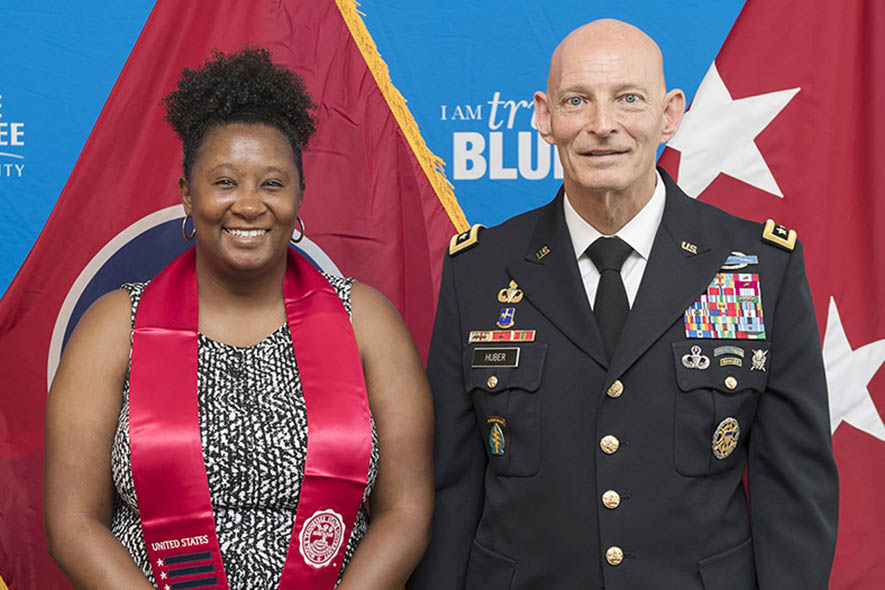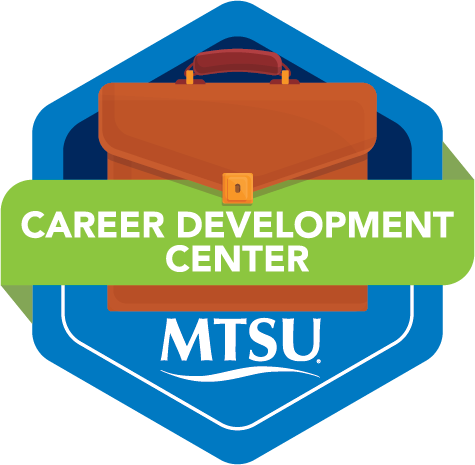
Commerce
Gain a flexible, business-focused education appropriate to any career. Online, on-ground, or hybrid options available.
Commerce, B.S.
The Bachelor of Commerce degree provides a broad-based course of study in business while maintaining the flexibility necessary for the modern college student. The program is a good fit for small business owners, administrative employees, managers, entrepreneurs, and sales representatives.
MTSU's Bachelor of Commerce degree is ideal for students who have a career and need a degree for advancement. On-ground, online, or hybrid classes meet any student's scheduling needs. The business community highly respects Jones College's high-quality Commerce program, and many employers visit campus each year to recruit our business majors. Graduates from the Commerce program have an average starting salary of $57,000.
News Briefs

Mentorship and support for completing my degree
"As a Veteran, I was excited to find out that MTSU has a very strong community of Veterans and ample support services specifically designed with Veterans in mind. I truly enjoyed my time at Jones College of Business at MTSU. The mentorship I received from the teaching staff was more than I could have hoped for. They definitely exceeded my expectations, and I felt 100 percent equipped to step out into the real world. I would highly recommend MTSU's Jones College of Business."
— Theresa Huntley, 2016, MTSU Jones College of Business, Realtor at Crye-Leike

Convert military experience into college credit
The B.S. in Commerce degree allows military veterans and reserve military the opportunity to use college credit earned for military education. The Jones College dean's office will review transferable military college credits after receiving a Joint Services transcript, a Community College of the Air Force transcript, or approved and recognized military training transcript. College credit for military education allows service members up to 24 hours of elective credit, which apply to the 120 hours required for a bachelor's degree. Efficient utilization of military service credits allows veterans and reservists the opportunity to move into a commissioning program with specific time limitations, like Green to Gold, or into a graduate program.
News Briefs
Mentorship and support for completing my degree

"As a Veteran, I was excited to find out that MTSU has a very strong community of Veterans and ample support services specifically designed with Veterans in mind. I truly enjoyed my time at Jones College of Business at MTSU. The mentorship I received from the teaching staff was more than I could have hoped for. They definitely exceeded my expectations, and I felt 100 percent equipped to step out into the real world. I would highly recommend MTSU's Jones College of Business."
— Theresa Huntley, 2016, MTSU Jones College of Business, Realtor at Crye-Leike
Convert military experience into college credit

The B.S. in Commerce degree allows military veterans and reserve military the opportunity to use college credit earned for military education. The Jones College dean's office will review transferable military college credits after receiving a Joint Services transcript, a Community College of the Air Force transcript, or approved and recognized military training transcript. College credit for military education allows service members up to 24 hours of elective credit, which apply to the 120 hours required for a bachelor's degree. Efficient utilization of military service credits allows veterans and reservists the opportunity to move into a commissioning program with specific time limitations, like Green to Gold, or into a graduate program.
Related Media

Commerce, B.S.
MTSU offers a high-quality Bachelor of commerce degree program that is well respected in the business community. Many different employers visit the MTSU campus each year to recruit commerce, economics, and business majors, and our graduates are employed in a variety of settings.
Examples include:
- Appraiser
- Banker
- Benefits administrator
- Compliance specialist
- Construction manager
- Entrepreneur
- Hospitality administrator
- Marketer
Employers of MTSU Bachelor of Commerce degree alumni include:
- Merrill Lynch
- Nissan Americas
- NORCAL Mutual
- Reese Group Inc.
- Teledyne
- Total Quality Logistics

MTSU’s Career Development Center
MTSU offers a comprehensive Career Development Center that serves students throughout the full student experience and beyond. They collaborate with faculty and staff to equip students with the tools to be marketable to the world of work and continuing education.
Students can schedule an appointment or check online resources and job boards at mtsu.edu/career.
Students can find current internship opportunities by talking to faculty and visiting the University job and internship board called Handshake.
Wondering what you can do with your major? Check out our What Can I Do with A Major In guides.



CONTACT US













